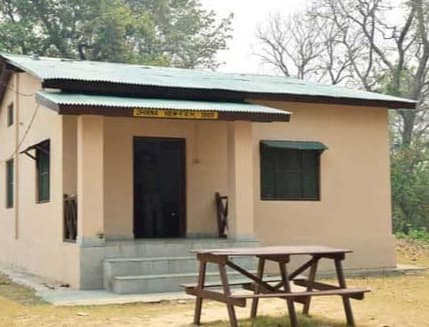Jhirna Forest Rest House – An Untouched Escape for Wildlife Seekers

Jhirna Forest Rest House – An Untouched Escape for Wildlife Seekers
Tucked away in the southern zone of Corbett Tiger Reserve, Jhirna Forest Rest House (FRH) is a hidden haven ideal for nature lovers, wildlife enthusiasts, and experiential travellers—including professionals seeking unique, grounded escapes.
Offering round-the-year safari access, rich biodiversity, and rustic forest accommodations, Jhirna stands out as a serene alternative to the more commercial zones like Dhikala and Bijrani. It’s especially suited for those who enjoy meaningful nature travel, wildlife photography, or eco-conscious offsite retreats.
🛣️ How to Reach Jhirna Forest Rest House
Jhirna FRH lies around 20 km from Ramnagar in Uttarakhand, located in the southern sector of the park.
✔️ Travel Options:
Mode Details
By Train Nearest station: Ramnagar (RMR) – direct trains from Delhi and Lucknow.
By Road Approximately 260 km from Delhi; well-connected by highway.
By Safari Entry via the Dhela Gate (southern gate).
Only registered jeeps with permits allowed—no private vehicles permitted.
🌿 Why Choose Jhirna Zone?
Though lesser-known, Jhirna offers distinct advantages:
- ✅ Open throughout the year, including monsoon season when other zones close
- 🐘 Frequent sightings of elephants, sloth bears, and occasionally tigers
- 🦋 Dense foliage rich with birds, butterflies, and bamboo groves
- 📸 Peaceful environment—ideal for low-crowd photography and nature immersion
Jhirna was once a village, relocated as part of conservation efforts. The result is now a thriving wilderness zone with restored habitats and minimal human interference.
🏡 Accommodation at Jhirna FRH
Run by the Forest Department, Jhirna FRH provides an authentic, no-frills stay inside the reserve.
Accommodation Highlights Approx. Tariff (INR) Old FRH Colonial-era rooms with vintage charm ₹2,000 – ₹2,500/night New Huts Quiet, basic cottages with privacy ₹2,200 – ₹3,000/night
Facilities:
- Verandahs facing dense forest cover
- Solar-powered lights, attached washrooms
- Shared kitchen (with basic assistance by forest staff)
- Chance of spotting wildlife near the boundary
🐅 Safari Experience in Jhirna
Safaris are available twice daily (morning and evening) with trained forest guides.
Detail Info Zone Jhirna (Southern Range of Corbett) Safari Type Only Jeep Safaris (no canters allowed) Duration Around 3 hours per safari Wildlife Tigers, elephants, sloth bears, wild boar Bird Species Jungle fowl, bee-eaters, flycatchers, and more
📅 Best Time to Visit Jhirna FRH
Season Months Experience Highlights Winter Nov – Feb Ideal for birdwatchers; cool and refreshing climate Summer Mar – June Best wildlife activity due to open water scarcity Monsoon July – Oct Lush greenery; Jhirna remains open unlike other zones
⚠️ Important Tips Before You Go
- Bring essentials: medication, torch, reusable water bottle
- Phone signal is minimal—a great excuse to unplug
- Stick to forest-friendly clothing (earth tones like green/brown)
- Avoid loud sounds, strong perfumes, or littering
- Respect wildlife and follow park rules—no stepping out of the vehicle
Facilities:
- Verandahs facing dense forest cover
- Solar-powered lights, attached washrooms
- Shared kitchen (with basic assistance by forest staff)
- Chance of spotting wildlife near the boundary
🐅 Safari Experience in Jhirna
Safaris are available twice daily (morning and evening) with trained forest guides.
Detail Info Zone Jhirna (Southern Range of Corbett) Safari Type Only Jeep Safaris (no canters allowed) Duration Around 3 hours per safari Wildlife Tigers, elephants, sloth bears, wild boar Bird Species Jungle fowl, bee-eaters, flycatchers, and more
📅 Best Time to Visit Jhirna FRH
Season Months Experience Highlights Winter Nov – Feb Ideal for birdwatchers; cool and refreshing climate Summer Mar – June Best wildlife activity due to open water scarcity Monsoon July – Oct Lush greenery; Jhirna remains open unlike other zones
⚠️ Important Tips Before You Go
- Bring essentials: medication, torch, reusable water bottle
- Phone signal is minimal—a great excuse to unplug
- Stick to forest-friendly clothing (earth tones like green/brown)
- Avoid loud sounds, strong perfumes, or littering
- Respect wildlife and follow park rules—no stepping out of the vehicle
Stay informed with our latest news and updates.
Get breaking news and curated stories delivered to your inbox every day.
Be the first to know what's happening around the world.